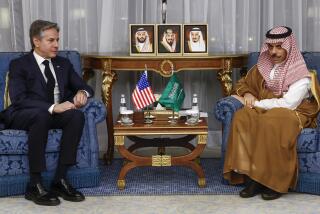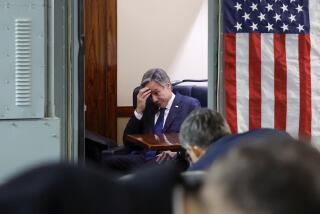Baker to Make 4th Mideast Peace Swing : Diplomacy: ‘As long as there is any reasonable prospect . . . we should continue to work at this,’ the secretary of state says.
- Share via
WASHINGTON — Secretary of State James A. Baker III, wearily describing the Arab-Israeli dispute as “this most intractable of all problems and conflicts,” said Monday that he will return to the Middle East late this week for another try at jump-starting the peace process.
“As long as there is any reasonable prospect of some chance of success, we should continue to work at this,” Baker said, “recognizing all the while that we are not able to impose a solution (and) that in the final analysis the parties themselves really have to want peace if it’s going to happen.”
But as Baker prepared for his fourth swing around the region since March 6, at least some of the parties provided new evidence of just how difficult his task will be. At a time when Washington is pleading for “confidence-building measures” to sweeten the atmosphere for possible talks, groups on both sides of the conflict took steps that seemed intended to shatter what little confidence there is.
The Israeli settler movement, Gush Emunim, announced three new additions to the enclave of Kiryat Arba near the predominantly Arab West Bank town of Hebron. And the Arab League added 110 new companies to its boycott list for doing business with Israel.
State Department spokesman Richard Boucher said Baker’s schedule is not yet final, although the secretary of state will visit Israel, Egypt, Syria, Jordan and perhaps some other countries. He is expected to leave Washington late Friday, although that, too, could change.
President Bush, asked why he was sending Baker back to the region less than two weeks after the end of his previous trip, replied: “Peace. We’re in quest of peace in the Middle East.”
Baker struck the same theme, but he sounded as if he was just going through the motions. Referring to Bush, he said, “We both believe that as long as there is any hope to deal with this most intractable of all problems and conflicts, we should continue to try. And we intend to do that.”
Meanwhile, Soviet Foreign Minister Alexander A. Bessmertnykh is starting his own tour of Israel, Egypt, Syria, Jordan and, perhaps, Lebanon.
Baker and Bessmertnykh have agreed to serve as co-chairmen for a Middle East peace conference intended to initiate face-to-face talks between Israel and neighboring Arab states and Palestinian residents of the occupied West Bank and Gaza Strip.
Baker said he expects to meet Bessmertnykh somewhere in the Middle East to compare notes.
The 12-nation European Community also is trying to bring Israel and its Arab adversaries to the negotiating table. Israeli Foreign Minister David Levy is scheduled to confer with EC foreign ministers next week in Brussels.
Levy, perhaps the most dovish official of Prime Minister Yitzhak Shamir’s hard-line government, warned fellow members of the Likud Party that Israel risks diplomatic isolation if it continues to rebuff efforts to get peace talks started.
He was quoted in the newspaper Maariv as saying Israel should “do everything to coordinate with the United States so that a situation doesn’t emerge where a solution is imposed on us. . . . Isolation shouldn’t be seen as an achievement.”
More to Read
Get the L.A. Times Politics newsletter
Deeply reported insights into legislation, politics and policy from Sacramento, Washington and beyond. In your inbox three times per week.
You may occasionally receive promotional content from the Los Angeles Times.










